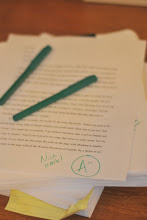I recently had a conversation with a teacher from Holland and a teacher from Kansas City.
We were talking together about education and the big issues that seem to be at the forefront of the conversations about it in the US vs. Holland. The teacher from Holland indicated that his country discusses the same issues we do--assessment, standards, funding.
I made some crack like, "well, we can't all be Finland, can we?"
He smiled. He acknowledged the view that from the outside that people have of Finland, how people hold it up as THE model for how to do education. F. Scott and I have spent a lot of time actually talking about Finland--the standards are dare I say beautiful and child-centered and exactly what I want for my own kid. The structures in place to train, mentor, and support new teachers are dreamy compared to the anti-teacher rhetoric currently taking over our country.
And then this teacher from Holland told me a few things that started to burst that little halo of perfection I had maintained in my mind around the topic of Education in Finland. The teachers, he explained, are VERY traditional. Though the standards may appear child-centered, the classrooms often are not. The teachers do not innovate or try anything new or out of the ordinary. School is what school has been for years. Also, school there tends to appeal more to the ways that female students learn and think--school in Finland is not working actually for scores of young Finnish males and they drop out, thus complicating this view of how successful their schools are (not as successful as I thought they were if they're not meeting the needs of a huge portion of their students and unwilling to innovate in order to do so).
So what do we do? Of course there are things that Finland is getting right that we aren't, and there are things that we're getting right that Finland isn't. But is there anywhere that's getting it all right? Anywhere we can hold up as THE example?
No. There's not.
We just have to figure out what works for our students in our communities, and we need to cultivate space to learn from each other, from each other's successes and failures across schools, districts, and wider communities (yes, even across the globe).
There is no ONE way to do this. There is no certainty in good education. Test scores are not the ultimate measure of success either. It's all murky and complicated and complex and confusing (because learning is too) (and so is our world)--and if teaching is anything else, we're not doing it right.
M. Shelley
The Felonious Trump Legacy
10 hours ago

